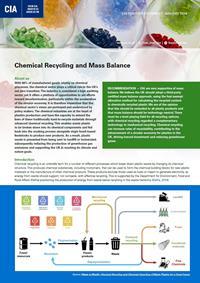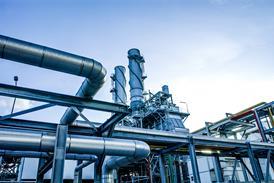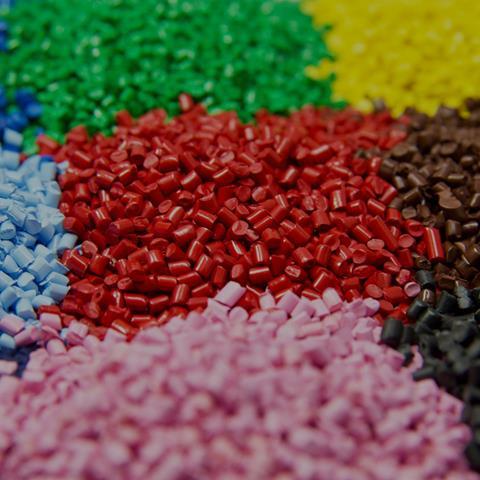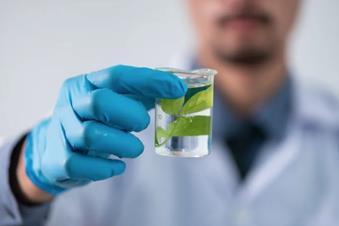About us
It is therefore imperative that the chemical sector’s views are portrayed and understood by policy makers. The chemical industries are at the heart of plastics production and have the capacity to extend the lives of these traditionally hard-to-recycle materials through advanced chemical recycling. This enables waste plastic to be broken down into its chemical components and fed back into the cracking process alongside virgin fossil-based feedstocks to produce new products. As a result, plastic waste is prevented from being sent to landfill or incinerated, subsequently reducing the production of greenhouse gas emissions and supporting the UK in reaching its climate and nature goals.
RECOMMENDATION
CIA are very supportive of mass balance. We believe the UK should adopt a third-party certified mass balance approach, using the fuel exempt allocation method for calculating the recycled content in chemically recycled plastic. We are of the opinion that this should be extended to all plastic products and that mass balance should be technology neutral. There must be a level playing field for all recycling options, with chemical recycling regarded a complementary technology to mechanical recycling. Chemical recycling can increase rates of recyclability, contributing to the advancement of a circular economy for plastics in the UK, driving inward investment and reducing greenhouse gases.
Chemical recycling vs mechanical recycling
CIA view chemical recycling as a complementary, not competitive, technology to traditional mechanical recycling. It should be seen as part of the wider recycling picture below mechanical recycling in a waste hierarchy which prioritises a reduction in production and consumption. Unlike mechanical recycling, chemical recycling enables complex materials, including films and flexibles which must be collected by local authorities by March 2027, to be recycled while producing a higher grade of recycled plastic. Therefore, chemical recycling supports mechanical recycling by compensating for the latter’s shortcomings through being able to recycle mixed plastic waste streams, multi-layered products, and contaminate plastics – such as films from food containers.
It is important that mechanical recycling continues to be supported and improved through the implementation of more advanced collection and sorting practices. According to the RECOUP 2022 Household Waste Collection Survey, in 2021 833,000 tonnes of plastic remained uncollected for recycling, instead being sent to landfill or for energy recovery. A more robust collection and processing system can reduce contamination, reduce time-associated costs, and achieve higher recycling rates. Improved systems for collecting and sorting waste also serve to benefit advanced recycling as it provides higher quality feedstock flows to be recycled and turned back into plastic products. Therefore, it is imperative that we improve collection and processing to increase materials entering the circular economy and to ensure adequate plastic waste feedstock.
When used in conjunction with mechanical recycling, chemical recycling can help to achieve higher levels of reuse and recycling. Subsequently, chemical recycling prevents plastic waste from being incinerated or going to landfill and can substitute significant amounts of fossil feedstock with recycled feedstock. As a result, chemical recycling leads to a reduction in greenhouse gas emissions, contributing toward the UK’s climate and nature goals.
Why mass balance?
Once co-fed into the cracking process, virgin and recycled feedstock cannot be separated. Therefore, a verified approach to calculate chemically recycled content in plastics is needed; mass balance offers the solution. As a chain of custody approach, mass balance can track materials through a complex value chain, allowing recycled inputs which are mixed with virgin materials during the process to be allocated to particular outputs.
There is a growing demand from stakeholders for products to have greater green credentials. To meet this demand and ensure chemical recycling can effectively contribute to the UK’s circular economy, Government must entice investment with secure and consistent regulations. Up until now the UK has not had specific standards in place for the process of chemical recycling and the allocation of recycled content. It is highly probable that this lack of consistency and stability will have driven away potential investment. Therefore, the acceptance of the mass balance approach for the purpose of chemical recycling – and other technologies which seek to fuse recycled and virgin feedstock – is likely to drive investment into the UK and benefit both our economic and environmental credentials.
A recent report from the Institute for Public Policy Research (IPPR) has warned that the UK is failing to seize the economic advantages presented by the global shift towards a net-zero carbon future. The report argues this is primarily due to the lack of a green industrial strategy and the UK’s public investment commitments to low-carbon technologies being among the lowest in the G7. It is therefore not surprising that the UK is experiencing a divestment of funds for green technologies because there is the lack of certainty around the UK as an attractive green investment zone. Other jurisdictions have concrete finance schemes to provide investors with the security they need to put money into the UK. This is most apparent in the US and the EU with the introduction of their green finance packages, the Inflation Reduction Act and the Net Zero Industry Act, respectively. We are still awaiting a response from the UK Government to our overseas competitors. We urge the government to publish a comprehensive response to these financial plans to assure investors that the UK is both a safe and prosperous place to invest in green technologies, not only for our own economy but for the state of the UK’s climate and natural surroundings.
Chemical recycling using mass balance is a relatively novel concept, therefore there is an opportunity for the UK to capitalise on this technology. If the UK were to make significant investments, we may be able to take a leading role culminating in job creation and potentially finding ourselves in a position to export recycled feedstock outside of the UK. The UK has a history of exporting plastic waste; 0.48 million metric tonnes were exported in 2022 with the Netherlands and Turkey among the top destinations for UK plastic waste exports. However, countries are beginning to refuse receival of plastic waste exports, providing yet another reason for the UK to become more adept at handling waste through improved processing facilities. It is important that we stop regarding this as waste and begin to see it as a valuable resource.
Find out more.

Chemical Recycling and Mass Balance
Chemical recycling can increase rates of recyclability, contributing to the advancement of a circular economy for plastics in the UK, driving inward investment and reducing greenhouse gases.
DOWNLOADPDF | 833 Kb





















